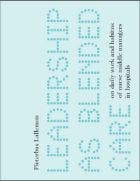Pieterbas Lalleman
Leadership as blended care: on daily work and habitus of nurse middle managers in hospitals

- Datum
- (Co) promotoren
- 16-11-2017
- prof.dr. M.J. Schuurmans, prof.dr. G.A.C. Smid
Samenvatting
This thesis describes the daily work of nurse middle managers at the frontline of patient care in general hospitals. Their clinical leadership is of the upmost importance in hospitals. It contributes to continuous quality improvement, patient safety practices, patient centeredness, support of nursing staff and the continuity of the organization. Literature on ‘professionals in the lead’, shows that healthcare managers with a clinical background are in advantageous positions compared to managers with no clinical background. However, being a ‘professional in the lead’ has some disadvantages as well. We explore the advantages and disadvantages of having a clinical nursing background for the emergence of clinical leadership in a middle management position in a general hospital. We explore which dispositions, that originate from their clinical nursing background, help or hinder and contribute (or not) to their clinical leadership, in areas such as, support of the nursing team, realizing patient safety or patient centeredness. The research questions are: 1. What do nurse middle managers do in their daily work? 2. What is their contribution to safe and patient-centred care? 3. How do nurse middle managers create value for employee and organisation? 4. What dispositions help and which hinder? 5. What could support nurse managers in further develop their contributions to create patient, employee, and organisation value? The research design is based on Mintzberg’s managerial work and behaviour approach and on ethnography, to describe nurse managers’ daily work. We shadowed sixteen nurse middle managers during their work activities. They worked in four different hospitals (in the Netherlands and two in the United States). In each hospital four nurse middle managers were shadowed for four days per person. This led to 560 hours of observation, 2490 pages of field notes and 61 hours of audio fragments. Additionally, we conducted document analysis, member checks and semi structured interviews. During data analysis we used a variety of ‘sensitizing concepts’, such as Bourdieu’s concepts of ‘dispositions of habitus’, ‘field’, ‘capital’. The data analysis has been both inductively developed, and theoretically based. We conclude that nurse middle managers can play a crucial and not-to-be underestimated role at the frontline of care. They can enhance safe, high quality and patient-centred care, support for nurses, and organizational continuity and performance. This requires a specific leadership practice: that of clinical leadership as blended care. This emerging leadership practice is characterized by curbing the urge to care, an investigative stance, ‘heads-on’ patient-centeredness, context-based practice, teaming, and collaborative organizational learning. The challenge now is to create an overall upgrade of nurse managers’ and clinical nurses’ educational levels through a dual track curriculum that focusses on both clinical and organizational aspects of daily hospital work, with shadowing as a potential strong experimental learning tool in the development of clinical leadership practices. Future research should focus on mixed-methods and practice-based studies to decipher in more detail the working elements of leader and leadership development programs and their impact on patient care and hospital performance.
